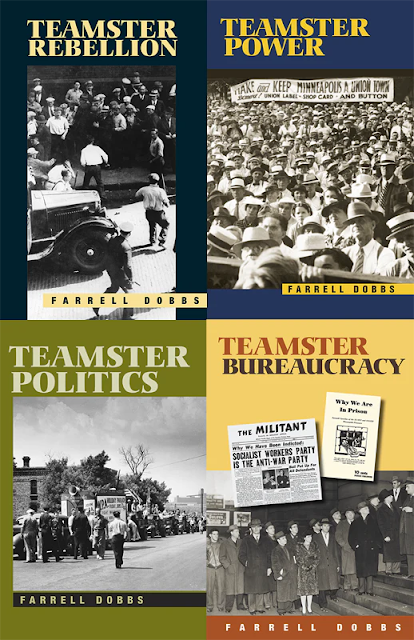 |
| Farrell Dobbs 4 volume history of the Teamsters union |

After the strike gained the union its recognition, Mr. Dobbs became secretary-treasurer of Teamster Local 574 and set out to organize the truckers of the Middle West into a body that spoke with one voice. By 1938 he led the drive that got 250,000 over-the-road union drivers a uniform 12-state contract.
Previously, the teamsters' union had deemed intercity truck drivers as not worth the bother, and the union's president at the time, Daniel Tobin, contemptuously referred to them as ''trash.'' The national teamsters organization was little more than a loose confederation of autonomous locals.
Mr. Dobbs went after the intercity drivers and organized regionally, before going full time into politics to do battle with the Stalinists. James R. Hoffa took over the regional council in the mid-1940's and expanded it into the South. When he replaced the discredited Dave Beck as the teamster president, Mr. Hoffa rapidly brought control by the central union to the West and East as well.
Mr. Hoffa, himself eventually convicted and jailed, remarked before his later disappearance that he could not agree with Mr. Dobbs's politics or his visions of unions as a political force. But Mr. Hoffa said Mr. Dobbs, using long-distance drivers to spread the word, was ''enormously beneficial'' to the American labor movement. (Wolfgang Saxon, Farrell Dobbs, Trotskyist, Dead, Sought the Presidency Four Times, New York Times, November 3, 1983)
He was one of 17 Trotskyists that were imprisoned during World War II for taking a principled position against imperialist war. In later years he ran for President several times on the SWP ticket. He became National Secretary of the Socialist Workers Party in 1953, succeeding James P. Cannon, a position he held until his retirement in 1972. He was the author of a four-volume history and memoir of the Minneapolis struggles. Dobbs died in 1983.
 |
| SWP leaders James P. Cannon, left, and Farrell Dobbs during Smith Act frame-up trial in 1941.Both were convicted, jailed for 13 months for opposing the U.S. rulers’ imperialist war policy. |
To start the playlist click on the image below.
To watch each segment individually select one of the following links:
Lecture 3 Trotskyist Leadership of Local 574 Part 1
Lecture 3 Trotskyist Leadership of Local 574 Part 2
Lecture 2 General Strikes and the Communist Party Part 1
Lecture 1 Overview and the Coal yard Strikes Part 2














No comments:
Post a Comment